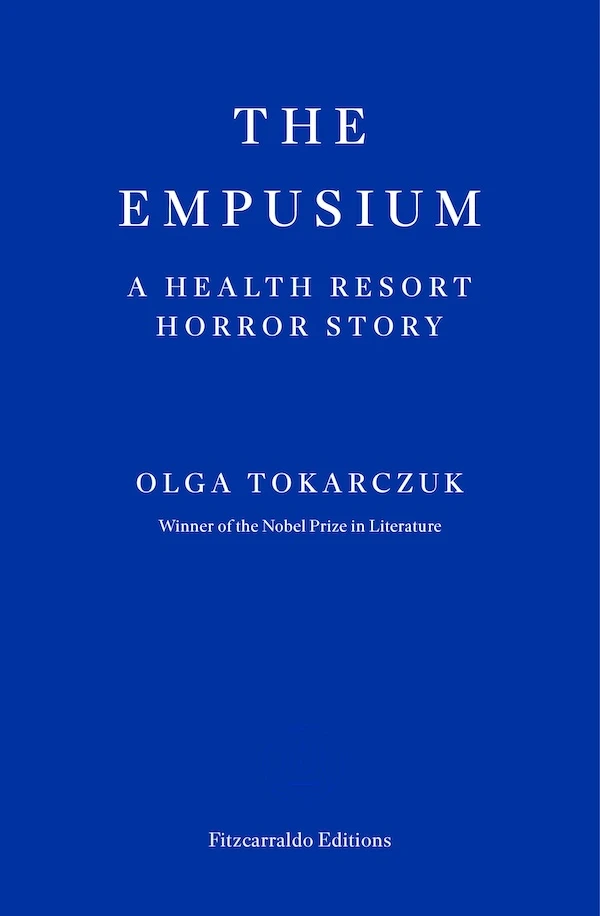
A tale for the ages from eerie Görbersdorf
Incredibly vivid and utterly unforgettable
In Grecian mythology the empousa or empusa are shapeshifting beasts who took on a female form to seduce and feed on young men. This is all I knew about the title of this book when I first started reading it. I also learnt, from the blurb, that it was in some way a “revisit” to Thomas Mann’s 1924 novel The Magic Mountain. But having never read that book I wandered into The Empusium without much in the way of orientation.
From the start this book is a celebration of striking imagery that caters to all our senses. From the moment our protagonist, the 24-year-old Mieczysław Wojnicz, alights his train to when he is chauffered to Görbersdorf and through every moment thereafter, what he sees, hears, feels and says drives the story forward with the expertise of a skillful artist who has honed their craft beyond measure. To say that masterful storytelling takes centre stage in The Empusium would be an understatement: Olga Tokarczuk is a Nobel laureate after all.
Strange behaviours, eerie screams, persuasive drinks, forests with psychedelic mushrooms and life-size female puppets, tales of murder and butchery, and persistent suspicion all permeate a characteristic small town in which the ‘health resort’ is located. You might expect all of these as classic tropes in horror novels—and of course the book delivers on that count—but the real charm of this book is how its literary nature lifts these tropes to a whole new realm, splattered with subtle commentary on feminism, supported by plenty of comedy and weaved between plenty of folklore.
An author’s note exists just after the story winds down:
All the misogynistic views on the topic of women and their place in the world are paraphrased from text by the following authors:
Augustine of Hippo, Bernard of Cluny, William S. Burroughs, Cato, Joseph Conrad, Charles Darwin, Émil Durkheim, Henry Fielding, Sigmund Freud, H. Rider Haggard, Hesiod, Jack Kerouac, D.H. Lawrence, Cesare Lombroso, W. Somerset Maugham, John Milton, Friedrich Nietzsche, Ovid, Plato, Ezra Pound, Jean Racine, François de La Rochefoucauld, Jean–Paul Sartre, Arthur Schopenhauer, William Shakespeare, August Strindberg, Jonathan Swift, Algernon Charles Swinburne, Semonides of Amorgos, Tertullian, Thomas Aquinas, Richard Wagner, Frank Wedekind, John Webster, Otto Weininger and William Butler Yeats.
And Tokarczuk does not take them on lightly or callously. There is a subtlety and an undeniable weight to the commentary throughout this book. Much of it comes in the form of a ghostly external narrator speaking in the plural first-person. Making no flourish, this strange narrator enters and leaves as they please, cutting short narratives as they wish, drawing your focus on things or stealing focus from other things throughout the book. Only the very first time this happens did I find myself stopping to re-read it, slightly taken aback, as if someone whispered something to me over my shoulders. But soon I found myself eagerly awaiting the return of our mysterious narrator.
There is a twist in this tale, even one you might see from afar. But the twist is hardly the point of this work of literary horror. It is the second act that, for me, steals the show. A painful, methodical demonstration of misogyny delivered matter-of-factly that makes you writhe with discomfort. These are people of a different time, you might argue, and Tokarzcuk says little else (see the author’s note above) because it matters little which time such views were held. It matters much more that we acknowledge that such viewes were held at all and move forwards from there. But of course the book is no so much in your face that it tells you any of this. That, rightly, is left to the reader.
A sensitive, thoughtful reader might draw much from it. A less introspective one might even find it offensive. For neither is the book to blame. It is understandably not everyone’s cup of tea but if you want to lose yourself in an otherworldly tale, look no further than the pages of The Empusium, a modern classic.
This was a book I originally judged by its cover—literally. I walked into a Waterstones looking for a new book to read and picked this up simply because the simplicity of the cover of the Fitzcarraldo Editions appealed to me. This was the first I had heard of either the publisher or Olga Tokarczuk but the blurb was good enough to pique my interest. It would turn out to be the first time I ever congratulated myself for judging a book by its cover. If you stumble upon a copy of The Empusium, read it. If not buy or borrow a copy and read it anyway.